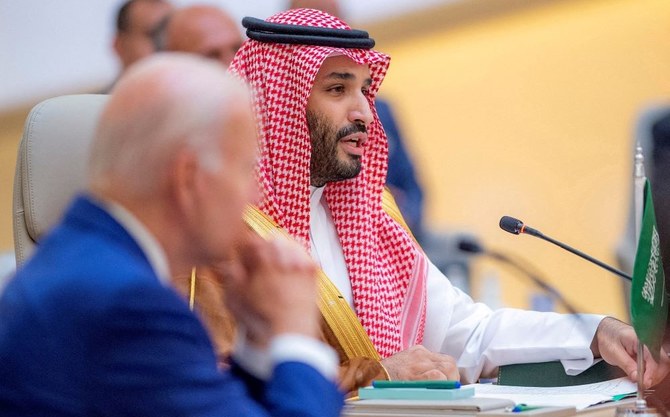
- ARAB NEWS
- 14 Jul 2025

At the opening of the Jeddah Security and Development Summit this week, Crown Prince Mohammed bin Salman said: “We call on Iran, as a neighboring country, with which we share religious and cultural ties, to cooperate with the countries of the region to be part of this vision, by adhering to the principles of international legitimacy, noninterference in the internal affairs of other countries, cooperating with the International Atomic Energy Agency, and fulfilling its obligations in this regard.” This part of his speech is the main key to understanding Saudi foreign policy in terms of its relationship with neighboring countries, specifically the Iranian regime.
Contrary to what many observers thought, Saudi Arabia did not use the Jeddah summit as a platform to wage war on Iran. On the contrary, the crown prince’s speech came as a message of peace. He wants Iran to be part of a common Gulf vision, through which it can provide security for waterways and energy sources and cooperate in confronting terrorism and drug trafficking, while also facing the repercussions of the Russian-Ukrainian war, problems of economic inflation, faltering supply chains, and food security and epidemics. These are files of great importance to Saudi Arabia and, therefore, the Kingdom is serious in its desire to find solid ground for permanent and stable relations with the Iranian regime.
Moreover, Saudi Arabia sent a message of reassurance to the Iranian regime, which is apprehensive of the US and Israel, when Foreign Minister Prince Faisal bin Farhan confirmed that the Jeddah summit did not raise the idea of establishing an “Arab NATO” that includes Israel. He said: “The Kingdom’s hand is extended to Iran to reach normal relations.” He added: “But we have not reached understandings yet and the Kingdom is committed to finding a positive understanding with Iran.” He also noted that “there are concerns of Iran’s activities.”
The concerns that Prince Faisal referred to are related to the Iranian nuclear program. He hoped that “Iran will choose diplomacy with regard to the agreement on its nuclear program,” as any text of a future agreement that Iran can reach in its nuclear negotiations is of great importance to countries of the Gulf. The region’s states want an agreement that addresses their security concerns and does not allow the Islamic Revolutionary Guard Corps to continue its support for the Houthis in Yemen or the armed militias in Iraq, Lebanon and Syria.
Five rounds of Saudi-Iranian dialogue have taken place so far under Iraqi sponsorship and personal follow-up by Prime Minister Mustafa Al-Kadhimi, who knows that the return of relations between Riyadh and Tehran would constitute a guarantee for the stability of Iraq and the Arab Gulf. It would also enable Iraq to reduce the threat of armed militias, which he considers a major obstacle to institution-building in the country.
Al-Kadhimi is aware that the IRGC, through its support for factions such as Kata’ib Hezbollah, Harakat Hezbollah Al-Nujaba, the Imam Ali Battalions and other armed organizations, will not help Iraq to build a modern and civil state. Instead, it wants to turn it into a training ground for elements opposed to the Arab Gulf states, a gateway for arms smuggling toward Syria and Lebanon, a backyard for money laundering, and a platform for launching drones against energy sources in Saudi Arabia and other Arab countries.
Some of these militias take their orders directly from Iran and others operate with some independence. There are also small armed cells that are out of control and are skilled in firing Katyusha rockets. These cells are a source of real danger because it is not known exactly who is behind them, what their goals are and what they might do next. Therefore, if any Saudi-Iranian reconciliation takes place, Al-Kadhimi will be able to pressure the Iranians to lift the legitimate cover on these unruly militias and finish them off with the fewest possible losses.
There are now several commonalities between the Arab Gulf states, Iraq, Egypt and Jordan. These nations, which represent Arab moderation, have a clear vision of security and peace in the region. It will not be easy for Iran to fully integrate with them, but they can find many commonalities that Tehran can work on to build trust and cooperation.
The first steps may include respect for the neighborhood, noninterference in the internal affairs of other countries and stopping conspiracy. These general guidelines, if the Iranian regime adheres to them, will help Saudi Arabia and the other Gulf states reduce Iran’s international isolation and open up to it economically, socially, developmentally and politically. These relations, if they develop, will be in the interest of the Iranian people and will help alleviate the problems of the Iranian economy, which is suffering a great deal due to sanctions and inflation.
The Kingdom is serious in its desire to find solid ground for permanent and stable relations with the Iranian regime.
Hassan Al-Mustafa
Iranian politicians have spent a lot on wars and building networks of militias as part of the strategy of “exporting the revolution,” which is the ideological idea that must end. The Iranian regime should be preoccupied with building the state and the welfare, security and stability of its people.
The real competition with the countries of the region should not be an arms race, media escalation or proxy wars, but rather through bilateral cooperation on the one hand and natural competition in development, technology, industry, education and modernization on the other. So, will Iran read the messages of the Jeddah summit with a new and calm mind and revert to dialogue without a desire for acquisition but according to the logic of partnership?
Hassan Al-Mustafa is a Saudi writer and researcher interested in Islamic movements, the development of religious discourse and the relationship between the Gulf Cooperation Council states and Iran. Twitter: @Halmustafa